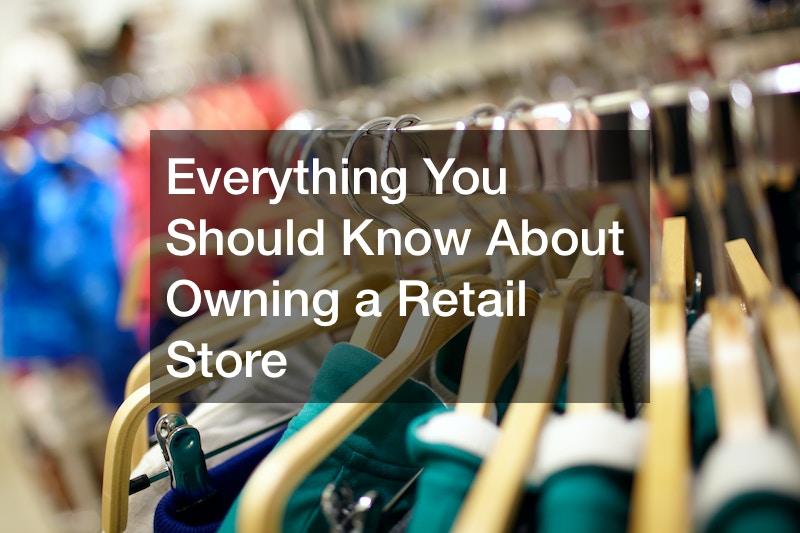
It takes a lot of preparation and planning to run a business. The average entrepreneur will find plenty of challenges along the way, especially during the initial stages. Over 20% of new businesses struggle within the first two years, showing that inexperience can play a vital factor in how a person’s business turns out. Nearly half of said businesses will close their doors within the first five years, usually due to a lack of profit or improper management. If you are an entrepreneur, those statistics can be scary. However, you will find plenty of benefits to owning a business, mainly a retail store.
Investing in building a retail store can be profitable for business owners. The financial implications, like wealth equity and commercial property tax exemptions, can entice them to start the investment, especially in a space that produces high foot traffic. Of course, it can be challenging for business owners to understand everything about owning a retail store. Here is a guide to help you manage the commercial establishment and create a good customer experience.
Identify Retail Store Type

One of the crucial aspects of this venture is understanding what type of retail store to open. The choice of merchandise plays a pivotal role in determining the store’s success. Entrepreneurs must thoroughly assess market trends, consumer preferences, and local demand before settling on a niche. This careful consideration ensures that entrepreneurs know everything about owning a retail store, resulting in a higher likelihood of attracting and retaining customers.
A flooring store caters to consumers looking to enhance the aesthetics and functionality of their living or working spaces—the benefits of opening a flooring store lie in the constant demand for quality flooring materials. Homeowners and businesses frequently seek new flooring options, creating a consistent customer base. Additionally, flooring stores often benefit from repeat business, as customers may return for additional projects or recommend the store to others.
A furniture store presents another lucrative option for aspiring retail owners. The demand for furniture is perpetual, driven by homeowners, businesses, and interior designers seeking to furnish spaces with style and functionality. Furniture stores offer a wide range of products, allowing entrepreneurs to curate a selection that caters to diverse tastes and preferences. A well-designed furniture store can become a destination for those needing high-quality and aesthetically pleasing furnishings.
A Western apparel store offers a unique and specialized retail experience for those interested in a niche market. This type of store appeals to a specific demographic with an appreciation for Western fashion and lifestyle. Opening a Western apparel store allows entrepreneurs to tap into a passionate and loyal customer base. This niche can be particularly successful in regions where Western culture is celebrated or has a strong presence.
While flooring, furniture, and Western apparel stores represent lucrative options, there are countless other retail store types to consider. The key is identifying a niche that aligns with personal interests and market demands. Whether it’s a technology gadget store, a gourmet food market, or a vintage bookshop, understanding the specific needs and desires of the target audience is paramount. Successful retail ownership involves a combination of passion, market research, and adaptability to stay attuned to evolving consumer trends and preferences.
Ensure Space Functionality
Business owners must understand that selling merchandise is not all there is about owning a retail store. Besides being a seller of goods, retail store owners are responsible for their property’s design, management, and maintenance. The retail store itself will feel like an additional business, as ensuring its functionality will be vital to keeping customers coming in and out and reflecting your brand’s quality.
The functionality of a retail store will depend heavily on its design and layout. A well-thought-out design ensures a seamless flow of customers through the store, encouraging exploration and maximizing product exposure. It also helps create an appealing and immersive shopping experience, influence customer behavior, and drive sales.
The plumbing and electrical system is also essential. These systems are the backbone of the store, supporting various functions such as lighting, security systems, and electronic displays. A well-designed electrical system ensures proper lighting to showcase products effectively in a business dealing with intricate products like plumbing supplies. At the same time, strategically placed outlets accommodate live demonstrations and product testing. Additionally, a reliable plumbing system is crucial for product displays that involve water usage, showcasing the functionality of plumbing supplies in a real-world setting. You can secure plumbers if there are problems with the plumbing system, preventing possible water damage.
Furthermore, maintaining a retail space’s functionality will require managing the heating, ventilation, and air conditioning systems. Dealing with HVAC replacements will create a comfortable shopping environment for customers while providing a suitable space for staff to work in. Proper ventilation and climate control contribute to customer comfort and preserve the integrity of the displayed products. In a retail setting, where product quality is paramount, ensuring that HVAC systems are in optimal condition is crucial for preserving inventory and creating a conducive atmosphere for customers and staff alike.
Enhance Security

Security is essential when learning about owning a retail store, as these establishments are vulnerable to threats that jeopardize employees’ safety and business integrity. Common security threats include theft, burglary, vandalism, and even employee fraud. In an era where technology is advancing rapidly, cyber threats have also become a significant concern for retailers, with the potential to compromise sensitive customer data. Failing to address these security threats can result in financial losses, damage to reputation, and, in extreme cases, the closure of the retail business.
Implementing robust security systems is crucial for safeguarding a retail store against various threats. Surveillance cameras, alarm systems, and access control measures create a secure environment. These technologies deter potential criminals and aid in the swift identification and apprehension of wrongdoers. In addition, modern security systems often come equipped with remote monitoring capabilities, allowing store owners to keep a vigilant eye on their premises even when they are not physically present. This proactive approach enhances overall security and provides peace of mind for retail store owners, fostering a safer and more secure business environment.
Fences play a vital role in fortifying the security of a retail store. Installing durable fences is a physical barrier, discouraging unauthorized access and deterring potential criminals from attempting break-ins. A reputable fence company can provide tailored solutions to meet the specific needs of a retail establishment, whether it’s a chain-link fence for visibility or a more solid barrier for enhanced privacy and protection. Fences secure the perimeter and symbolize the store’s commitment to security, potentially dissuading criminals before they even consider targeting the establishment.
Partner with Essential Vendors

Partnering with essential vendors is crucial when talking about owning a retail store. Collaborating with reputable vendors ensures access to high-quality products and services, allowing retailers to create a visually appealing and functional store space. From sourcing merchandise to obtaining display materials, establishing strong partnerships with reliable vendors streamlines the procurement process, saving time and resources for retail owners. Moreover, these partnerships often lead to favorable terms, discounts, and exclusive deals, enabling retailers to enhance their competitive edge in the market.
Effective waste management is a vital aspect to understand about owning a retail store. Partnering with commercial waste disposal vendors is essential for maintaining a clean and environmentally responsible retail space. Proper waste disposal adheres to regulatory standards and contributes to the store’s image and customer satisfaction. By collaborating with waste management experts, retailers can implement sustainable practices, reduce their environmental impact, and potentially lower waste disposal costs. This aligns with the growing trend of eco-conscious consumers and demonstrates the retailer’s commitment to corporate social responsibility.
Collaborating with reputable office furniture vendors also ensures that retail spaces have functional and aesthetically pleasing furniture. From display counters to employee workstations, well-designed furniture enhances the overall shopping experience for customers and provides a comfortable and efficient workspace for staff. Partnering with office furniture businesses also allows retailers to stay updated with the latest trends in retail design, creating an inviting and modern atmosphere that resonates with their target audience. There are many other vendors to consider, like commercial cleaning services and logistics contractors for shipping merchandise. However, you can invest in those partnerships one at a time for strategic and cost-efficient growth.
Secure Legal and Financial Safety Net
Ensuring your retail store business has a financial and legal safety net is non-negotiable to its long-term success and sustainability. Businesses are susceptible to various challenges you might encounter about owning a retail store, ranging from economic downturns to unexpected legal issues. Without a solid safety net, these challenges can quickly escalate, leading to the failure of your venture. A comprehensive financial and legal strategy acts as a shield, providing protection and stability in times of uncertainty.
Exploring loan services is crucial for retail business owners when establishing a financial safety net. Securing adequate funding through loans can provide the necessary capital to navigate operational expenses, expand inventory, or invest in marketing efforts. This financial cushion helps weather economic downturns and enables your retail business to seize growth opportunities. Working with reputable loan services ensures access to competitive rates and favorable terms, allowing you to make strategic financial decisions that contribute to the overall health of your retail enterprise.
In tandem with financial tools, engaging the services of a business attorney is essential for building a solid legal safety net. A business attorney can guide you through the intricacies of contracts, intellectual property protection, and compliance with local regulations. They play a vital role in mitigating legal risks and offering counsel on employee disputes, contract negotiations, and potential litigation. By proactively addressing legal issues, you protect your retail business from unforeseen legal pitfalls and establish a foundation for sustainable growth.
Market Your Store

If there is something you must know about owning a retail store, it is that the landscape can be very competitive. You will be competing with hundreds of brands, shops, and boutiques within a similar field for customers, so you must ensure your specific store stands out. Brand marketing is crucial when thinking about owning a retail store, as it establishes a store’s identity and creates a lasting impression on customers. Building a strong brand involves creating a unique and memorable logo, choosing a consistent color scheme, and crafting a compelling tagline. These elements must be present in every aspect of the store, from signage to packaging. Utilizing these brand elements in promotional materials, such as flyers and banners, helps reinforce the store’s image and fosters brand recognition. Implementing loyalty programs and exclusive offers for repeat customers can also enhance the brand experience, encouraging customer loyalty and positive word-of-mouth about owning a retail business.
Social media has become a powerful tool for marketing retail stores. When thinking about owning a retail business, it’s essential to have a solid online presence. Social media platforms like Instagram, Facebook, and Twitter provide opportunities to showcase products, share behind-the-scenes glimpses of the store, and engage with customers in real time. Running targeted advertising campaigns on these platforms can help reach a broader audience, driving traffic to the physical store. Encouraging customers to share their experiences on social media through incentives like contests or giveaways can generate user-generated content, further promoting the store’s brand and fostering a sense of community. Social media becomes a valuable avenue to spread the word about owning a retail business and connect with a diverse customer base.
Exploring e-commerce options is another effective strategy for retail store owners. Establishing an online store allows for a broader reach, attracting customers who may not be able to visit the physical location. An easy-to-navigate website with high-quality product images, detailed descriptions, and secure payment options is essential for a successful online presence. Implementing online promotions, such as discounts or limited-time offers, can incentivize online shopping. Integrating an efficient inventory management system ensures that the online store accurately reflects the available stock, providing a seamless experience for customers.
Running a retail store requires proper planning and preparation for business owners. It requires continuous learning about owning a retail business, which is in a constantly competitive field. If you want to survive and thrive, you must be willing to learn how to manage the business effectively.



